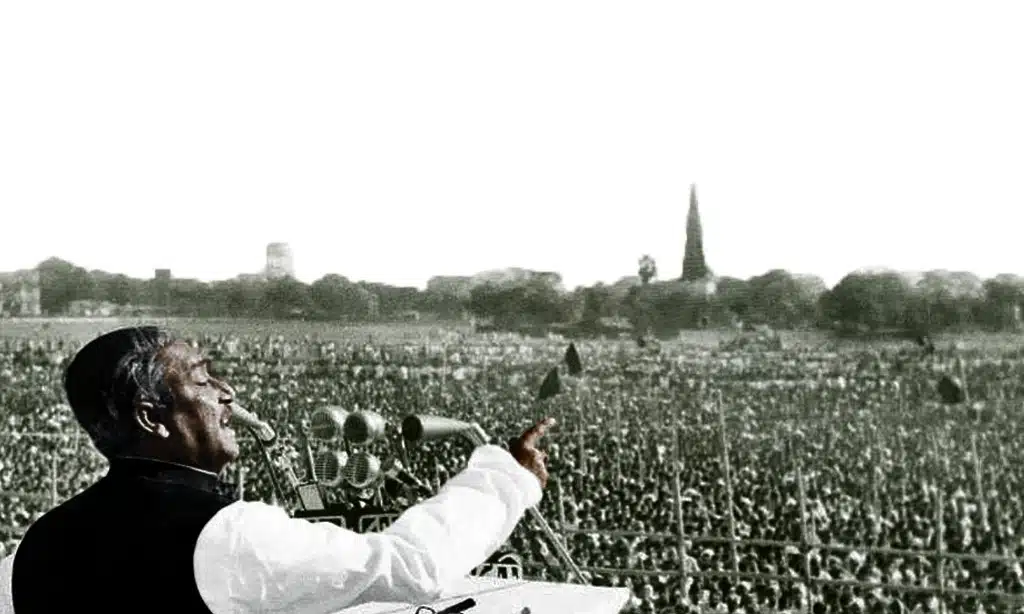Understanding the power of a speech that changed the course of history might seem challenging. You may wonder how words spoken at one time can have such a strong impact on the fight for freedom and identity.
This is where Sheikh Mujibur Rahman’s address on 7th March 1971, known as “The Voice of Liberation,” plays a pivotal role in inspiring generations.
One interesting fact about this speech is that it ranks among the most influential speeches ever delivered, celebrated for its profound impact and rhetorical brilliance. Our blog post will take you through an analytical journey, breaking down the elements that made this speech so compelling—from its emotional appeal to its political implications.
By doing so, we aim to provide insights into how effective is 7th March in the history of Bangladesh and how it shaped national destiny.
This ensures you’ll grasp why and how words matter in historical movements. Stay tuned!
The Historical Context of Sheikh Mujibur Rahman’s Speech
East Pakistan, now Bangladesh, was on the brink of a monumental change in 1971. The demand for autonomy in East Pakistan had grown louder and more insistent. Sheikh Mujibur Rahman, leader of the Awami League, stood at the heart of this fervent call for independence.
Tensions were high as talks with West Pakistani leaders and President Yahya Khan failed to bring about any agreement that would ensure fair representation and respect for East Pakistanis’ rights.
Sheikh Mujib’s speech on 7th March emerged against a backdrop of political unrest and public dissatisfaction. Discussions about Bangladesh’s constitution, discussions about national identity, and struggles against the oppression of West Pakistani officials characterized these times.
Into this charged atmosphere stepped Sheikh Mujibur Rahman; his words not only aimed to address immediate grievances but also to ignite a sense of unity among Bengalis towards self-determination.
His leadership through these turbulent times laid the foundation for what would become an impassioned movement towards Bangladesh’s independence.
An Overview of the 7th March Speech
Sheikh Mujibur Rahman stood before a sea of people at Suhrawardy Udyan, their eyes filled with hope and determination. With every word, he painted a vision of freedom and unity for Bangladesh.
The Occasion
The historic day of March 7, 1971, at Ramna Race Course in Dhaka, served as the backdrop for a pivotal moment led by Bangabandhu Sheikh Mujibur Rahman. This was not just any speech.
It marked a defining moment in the journey towards the independence of Bangladesh. The air was charged with anticipation and hope, as tens of thousands gathered to hear from the Father of Bangladesh himself.
They came from all corners—East Bengal to Chattogram—united under one sky, ready to witness history.
On this day, Bangabandhu didn’t just speak; he ignited a flame that would burn brightly through nine months of liberation war. His words were more than rhetoric—they were a war cry for freedom and a bold declaration against oppression.
Crowds listened intently, their hearts heavy yet hopeful. This wasn’t merely an address; it was the awakening call for an entire nation yearning for liberation.
This occasion seamlessly wove together individuals from diverse backgrounds into a single tapestry of collective resolve and aspiration towards independence. Rahman’s every word struck a deep chord with those in attendance as well as the countless others who heard it later, inspiring action among millions to join forces in what would grow to be a formidable fight for freedom.
The Audience
Sheikh Mujibur Rahman spoke to the hearts of Bangladesh’s people during his 7th March speech. He knew his audience well, understanding that they yearned for freedom and justice after years of struggle.
This speech wasn’t just words; it was a call to action for the citizens of what would soon become an independent Bangladesh. Bangabandhu tailored his message with precision, leveraging broadcasting theory to engage listeners at an ideal pace of 58–60 words per minute.
This approach ensured maximum impact, making every word resonate deeply with those who heard it. The people of Bangladesh felt seen and heard as Rahman outlined their collective dreams and aspirations for liberation from oppression.
His use of language and mass communication theories not only challenged them but also united them towards a common goal—freedom.
The Message
The message of the 7th March speech was clear and powerful, aiming directly at the heart of every listener. Bangabandhu called for a declaration of independence and inspired a nation to stand up for its rights.
His words marked the emergence of a new state, marking the end of East Pakistan’s struggles under West Pakistani rule. Using simple yet effective language, he connected with his audience on a personal level.
Through idioms familiar to them and a conversational style that included questions and answers, he made complex ideas accessible to all.
Throughout his speech, Bangabandhu skillfully used facts and logic to build his arguments. He motivated people not just with emotional appeal but also by presenting clear reasons why liberation was necessary.
This blend of inspiration and rationale is what made the 7th March speech a turning point in Bangladesh’s fight for independence. It wasn’t just about fighting; it was about understanding why they had to fight and believing they could win.
In-depth Analysis of Sheikh Mujibur Rahman’s Speech
Digging into Sheikh Mujibur Rahman’s speech reveals its power to inspire, moving hearts with words that echo through time—discover how it shaped a nation.
Use of Rhetoric
Sheikh Mujibur Rahman masterfully utilized rhetoric in his historic speech, weaving words with precision and power. His choice of phrases like “we shall never surrender” echoed the determination of the Bengali people.
Each sentence was crafted to stir emotions and rally listeners towards a single cause—the liberation war in Bangladesh. By speaking at an ideal rate of 58–60 words per minute, he ensured his message was clear, compelling, and unforgettable.
The impact was immediate; hearts were ignited with a newfound resolve for independence.
Rahman’s opening lines set a tone that resonated deeply with his audience. He invoked shared struggles and aspirations, connecting on a personal level with every individual present.
This strategic use of emotional appeal strengthened the unity among the Bangladeshi people against their oppressors. Through his rhetoric, Rahman not only declared independence but also inspired an entire nation to stand up for their rights, marking the beginning of Bangladesh’s journey toward sovereignty.
The effectiveness of Rahman’s rhetoric lay in its ability to mobilize the masses into action. His carefully chosen words—like “joy bangla” or “declaration of independence”—became rallying cries that transcended social barriers, uniting individuals under one cause: freedom from oppression.
Such powerful use of language sparked a movement across East Pakistan and played a pivotal role in shaping Bangladesh’s national identity. Additionally, you can also read about Sheikh Hasina is Iron Lady of Asia.
Emotional Appeal
Bangabandhu Sheikh Mujibur Rahman knew how to touch people’s hearts. His speech on March 7th, 1971, was no exception. He used simple words but packed them with powerful emotions. This approach made his message resonate deeply with everyone listening.
People felt inspired and motivated by his words because he spoke directly to their experiences, hopes, and fears.
He masterfully connected with the audience, weaving in phrases that felt personal and relatable. The speech ended on a high note—a declaration of independence that stirred strong feelings of patriotism and unity among Bangladeshis.
This wasn’t just any speech; it was a call to action that mobilized an entire nation towards its liberation war.
Political Implications
Sheikh Mujibur Rahman’s speech on March 7th, 1971, marked a turning point in the struggle for Bangladesh’s liberation. It was more than just words; it acted as a catalyst, setting the stage for independence from Pakistan.
The address underscored the failure of the Pakistani establishment to recognize and respect the political rights and aspirations of Bangalis. In simple yet powerful language, Rahman laid bare the injustices faced by his people, rallying them towards self-determination.
The speech also hinted at a shift in geopolitical dynamics within South Asia. It challenged not only the authority of West Pakistanis but also signaled to world powers that Bangladesh was ready to govern itself.
This moment became a cornerstone in South Asia’s history, inspiring other movements seeking justice and autonomy across the region. As Rahman eloquently put forward his vision for an independent Bangladesh free from oppression, he reshaped its national identity forever.
The Immediate Reception of the Speech
People across Bangladesh listened to Sheikh Mujibur Rahman’s speech, feeling a spark of hope and unity. Around the world, nations tuned in, witnessing the powerful call for freedom and justice.
Public Response
The 7th March speech by Bangabandhu Sheikh Mujibur Rahman struck a chord with the public. It was praised for its simplicity and power. The words of Rahman, filled with hope and determination, motivated many to support the liberation war in Bangladesh.
His conversational style made everyone feel as if he was speaking directly to them, making his message even more impactful.
Rahman’s speech became a principal document for Bangladesh’s liberty. Its positive reception showed how effectively it connected with the audience on an emotional level. The use of simple yet powerful arguments inspired people to take part in the struggle for independence.
His balanced approach, combining stern warnings with reassurances, won hearts across the nation, solidifying widespread support for the cause.
His ability to blend idioms and quotes into his message resonated well, encouraging active participation in the liberation movement. This public response paved the way for what would become a pivotal moment in Bangladesh’s history: its fight towards becoming an independent nation.
International Response
Countries around the world took notice of Sheikh Mujibur Rahman’s speech on 7th March 1971. It wasn’t just any talk; rather, it was a forceful call for independence that echoed great speeches by people like Winston Churchill and Martin Luther King.
Leaders and citizens across different continents saw it as Bangladesh’s declaration of freedom from Pakistan. This global recognition played a crucial role in shaping international support for Bangladesh during its fight for sovereignty.
Media outlets, from newspapers to radio broadcasts, spread the words of Sheikh Mujibur Rahman far beyond Dhaka’s crowds. His plea for justice and liberty resonated with people everywhere, drawing attention to the struggle in Bangladesh.
Such widespread coverage helped gather international sympathy and support, aiding the nation on its path to becoming an independent state recognized worldwide.
The Legacy of Sheikh Mujibur Rahman’s Speech
Sheikh Mujibur Rahman’s speech ignited a fire in the hearts of millions, paving the way for Bangladesh’s quest for independence. Today, it stands as a testament to the power of words in shaping nations and their identities.
Influence on the Liberation Movement
Sheikh Mujibur Rahman’s speech on March 7, 1971, ignited a fire among the people of what would soon become Bangladesh. It was a war-cry, motivating millions to stand up against oppression and fight for independence.
The words spoken that day didn’t just echo through the crowds; they turned homes into fortresses and streets into battlefields for freedom.
This moment in history marked a shift from peaceful protests to active liberation efforts. Calls to “close all roads” and confront the enemy head-on transformed civilians into soldiers overnight.
As a result, this address became more than a speech—it was the birth of Bangladesh’s war of independence.
The influence stretched beyond inspiring individuals; it united an entire nation under one cause. People came together from Chittagong to Dhaka as a result of Rahman’s compelling arguments and straightforward yet profound language.
This unity was crucial in eventually leading Bangladesh to its much-deserved sovereignty—a testament to how words can indeed change the course of history.
You May Find interest in Sheikh Hasina’s Leadership
The Impact of 7th March in the History of Bangladesh
Sheikh Mujibur Rahman’s speech on March 7, 1971, ignited a spark within the people of Bangladesh, crafting a new national identity centered around resilience and the quest for independence.
It positioned Bangladesh not just as a geographical territory but as a nation with its own voice, ready to stand firm against oppression. This powerful declaration resonated deeply, echoing through the hearts and minds of millions, setting the stage for what would become a historic liberation war.
The conversational style and use of speech idioms by Bangabandhu in his address bridged any gap between him and his audience. He wasn’t just speaking; he was connecting, mobilizing every person towards a common goal: freedom.
This unique approach not only made the message more relatable but also infused it with an emotional appeal that transcended mere words. As Bangladeshis rallied under this newfound identity, they found themselves part of something larger than life itself—a movement that would carve out their place in history.
Through Bangabandhu’s rhetorical mastery and strategic referencing of quotes that pulled at the nation’s collective heartstrings, he laid down not just the blueprint for independence but also shaped an enduring national ethos.
The legacy of his speech continues to be celebrated today, comparable to landmark addresses by global leaders like Winston Churchill and Martin Luther King Jr., underscoring its lasting impact on molding Bangladesh’s national consciousness.
The Speech in Popular Culture
The voice of Sheikh Mujibur Rahman echoed beyond the boundaries of time and geography, finding a place in popular culture worldwide. This legendary 19-minute speech has been featured in documentaries and films, showcasing its powerful impact on Bangladesh’s liberation war.
Artists have drawn inspiration from his words, creating music and paintings that capture the essence of freedom and resistance. Schools teach this speech, highlighting its significance in world history and its role as a masterpiece of rhetorical skill.
In Bangladesh, the speech is more than history; it’s part of the national identity. Every year on March 7th, people celebrate this day by listening to recordings of Bangabandhu’s address, rekindling the spirit of independence among young and old alike.
Television channels air special programs, while online platforms buzz with quotes from his speech. It serves as a reminder of resilience—a beacon for generations aiming to understand their heritage deeply embedded within these profound words.
Conclusion
Sheikh Mujibur Rahman’s speech on March 7, 1971, stood as a beacon of hope, igniting the fire for Bangladesh’s liberation. It wasn’t just words; it was a call to arms, an undying symbol of freedom.
Through powerful rhetoric and emotional appeal, Bangabandhu united a nation. This speech forever changed the course of history for Bangladesh, embedding itself in the heart of its identity and culture.
Truly, it remains one of the most remarkable speeches in both Bengali and global oratory.






































